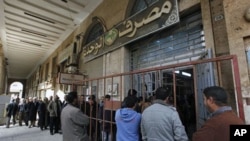The United States says it is consulting allies about military options for dealing with Libyan leader Moammar Gadhafi's deadly crackdown on opposition forces trying to end his 42-year autocratic rule.
U.S. officials said Monday "all options" are under consideration, including the imposition of a no-fly zone to prevent Mr. Gadhafi's air force from staging further attacks on rebels who control eastern Libya and parts of the west. British Prime Minister David Cameron said London also is working on a plan for a no-fly zone over Libya.
U.S. commanders said they were moving naval and air forces closer to Libya to provide the Obama administration with options for carrying out humanitarian or other missions.
The U.S. State Department said Washington has been in contact with Libyan opposition groups in recent days to understand their needs and concerns. But, U.S. ambassador to the United Nations Susan Rice said it is "premature" to discuss military assistance to the opposition while its various factions try to become more organized.
The United States also was increasing financial pressure on Mr. Gadhafi's government, freezing $30 billion in his family's U.S.-based assets following the imposition of unilateral sanctions last week. A U.S. Treasury official said the asset freeze is the largest ever to be approved by the U.S. government in a single executive order.
The United States and its Western allies want Mr. Gadhafi to step down immediately, saying he has lost legitimacy after his forces killed hundreds of opposition protesters and military defectors in the two-week-old uprising.
White House spokesman Jay Carney said Washington would support Mr. Gadhafi going into exile if such a move hastens his departure, but believes the Libyan ruler and his aides must be held accountable for their actions, regardless.
U.S. President Barack Obama telephoned Canadian Prime Minister Stephen Harper Monday to thank him for joining the United States in adopting tough sanctions against Mr. Gadhafi's government. Canada announced a series of sanctions Sunday, including an asset freeze on the Libyan leader and his relatives.
The White House said Mr. Obama and Mr. Harper agreed on a need to deter further violence by Mr. Gadhafi's forces, hold him and others accountable for human rights violations and provide humanitarian assistance to the Libyan people.
U.S. Secretary of State Hillary Clinton said Washington is allocating $10 million in emergency aid to organizations on the ground in Libya. Speaking on a visit to Geneva, she said the United States also is sending two humanitarian teams to help thousands of displaced people at Libya's borders with Tunisia and Egypt.
The European Union also agreed to a package of sanctions against Mr. Gadhafi Monday, reinforcing measures adopted by the U.N. Security Council last week.
Despite his increasing international isolation, the Libyan leader won some rare diplomatic support Monday from a longtime ally in Latin America. Venezuelan President Hugo Chavez said he will not condemn Mr. Gadhafi, and accused the United States of preparing to invade Libya to steal its oil.
In another development, the U.S. State Department said Mr. Gadhafi's government has fired its ambassador to Washington, Ali Aujali, who defected to the Libyan opposition last week. State Department spokesman PJ Crowley said Libya informed Washington that it is replacing Aujali with a chargé d'affaires who is a Gadhafi loyalist.
Crowley said Washington is maintaining diplomatic relations with Libya in order to keep the option of communicating directly with Mr. Gadhafi's government.
Some information for this report was provided by AP, AFP and Reuters.




